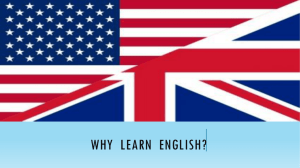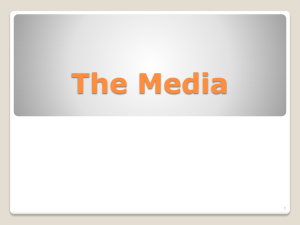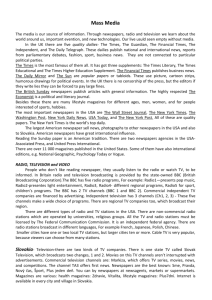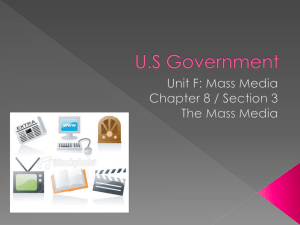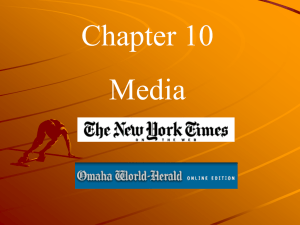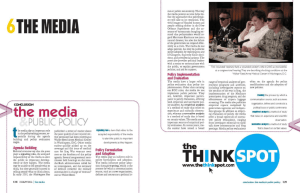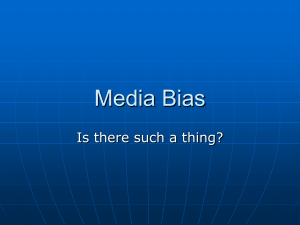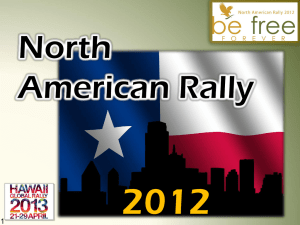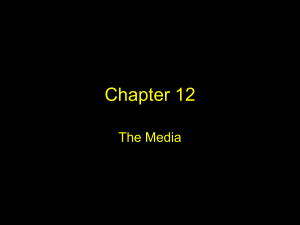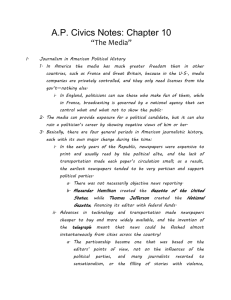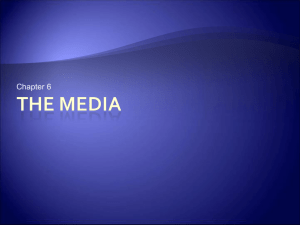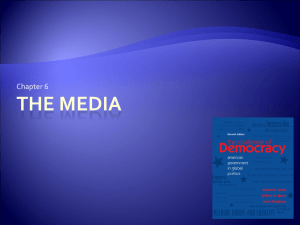Aim: What is the impact of the media on public opinion?
advertisement
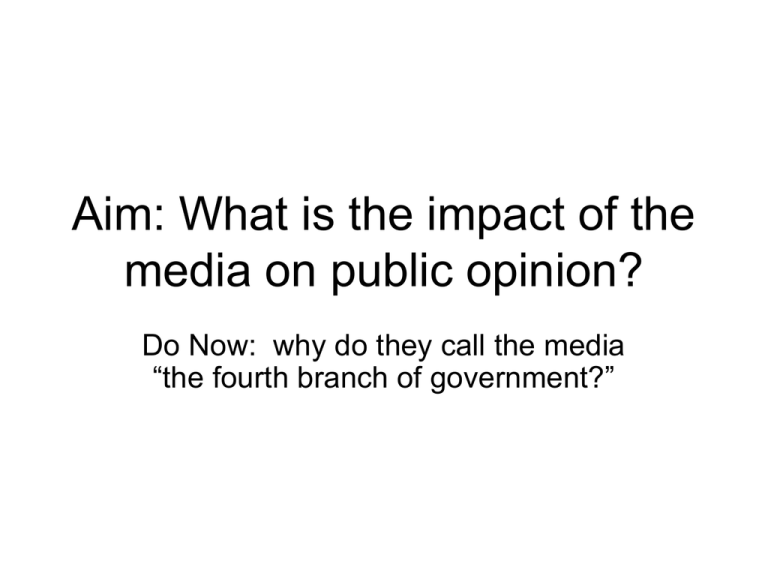
Aim: What is the impact of the media on public opinion? Do Now: why do they call the media “the fourth branch of government?” Functions of the Media • Entertainment • News • Agenda setting – ability of the media to draw public attention to certain issues and to ignore other issues • Political forum – place to make announcements or advertise government Agenda Setting – we must do something! How much power does the National Press have? 1. Gatekeeper: the media choose which stories to cover, how extensively, and for how long 2. Scorekeeper: the media keep track of and help make political reputations, note who is being “mentioned,” and analyze who is winning or losing • Focus on Presidential elections like a horse race (Iowa caucus and New Hampshire primary) 3. Watchdog: Investigate politicians and expose scandals How has the media evolved? • • • • • Changes in society and technology made possible self-supporting, mass readership daily newspapers The middle class favored new, progressive periodicals Radio arrives in 1920s, television in the late 1940s Today mass media includes: Electronic media (TV, radio, the internet), and Print media (newspapers, magazines) Most people get their news from television, but the internet is becoming an increasingly popular source, especially among young people How have the media changed? 1. In the early years, newspapers were controlled by parties, and were expensive to buy 2. Over the years, the public’s access to news became greater as newspapers became cheap, and televisions, radios, and computers became widely available 3. Most newspapers and TV and radio stations focus on local interests http://www.pewresearc h.org/facttank/2013/10/16/12trends-shaping-digitalnews/ http://www.peoplepress.org/2012/09/27/section-4demographics-and-politicalviews-of-news-audiences/ Newspapers • Number of daily newspapers has declined significantly • Number of cities with multiple papers has declined • Subscription rates have fallen as most people get their news from television Media Conglomerates • WHO OWNS THE NEWS??? •WHO OWNS INFORMATION? Media Conglomerates • Gannet owns USA Today and controls the biggest circulation in the nation + owns 100 additional papers • Rupert Murdoch owns 124 radio stations, New York Post, Weekly Standard, and FOX News Disney • • • • • • • ABC A&E History Channel Lifetime ESPN Marvel Entertainment Star Wars How do Politicians Adapt to Modern Mass Media? • Shorter sound bites on the nightly news make it more difficult for candidates and officeholders to convey their message • Politicians now have more sources— cable, early-morning news, news magazine shows • 40% of American households access the Internet • https://www.youtube.com/watch?v=z2jie_ B1n2E • https://www.youtube.com/watch?v=NDrbzt CiRP8 How are the media regulated? 1. Prior Restraint: The First Amendment stipulates that the government (Federal, state, local) cannot place prior restraint (censorship) on the press except under narrowly defined circumstances • The Pentagon Papers 2. Confidentiality of Sources (except in certain criminal investigations) 3. FCC Rules: • In the past, the Fairness Doctrine was followed: broadcasters had to give time for opposing points of view - This was abandoned because competition among news outlets provides opposing views • Equal Time Rule: Stations must sell equal amounts of time to candidates FCC • Federal Communications Commission • Controls the media, no one may operate radio or TV stations without their license • Who are they? – 5 members nominated by President for 5 years. Government Constraints on the Media • Reporters must strike a balance between expressing critical views and maintaining sources • Governmental tools to fight back: numerous press officers, press releases, leaks, bypass the national press in favor of local media, presidential rewards and punishments Aim: Are the news media biased? 1. Most members of the national media are liberal and secular • • • Conservative talk shows have become more prominent on TV and radio in recent years Outright bias is unlikely, but news outlets can choose which stories to cover, how in depth the coverage will be, and what type of spin to put on the story. Pundit: an expert, often featured on television, who offers analysis and opinion on a particular subject, usually politics. Table 12.2: Journalist Opinion Versus Public Opinion Types of Stories: 1. Routine: cover major political events • Most news outlets cover these stories the same way 2. Feature Stories: events that are public, but a reporter has to persuade an editor to publish them 3. Insider Stories: things that are secret and uncovered through investigative journalism • Feature and insider stories can more easily reflect political bias. 4. Loaded Language: words that imply a value judgment to persuade a reader without having made a serious argument McCain Slams LA Times for Double Standard in Withholding ObamaKhalidi Tape Obama takes top billing on U.S. television On TV, it seems like it’s all Obama, all Obama's Aunt the time Found Living in Rundown Boston John McCain: Neighborhood Obama lied about public financing MSNBC FOX NEWS CNN How much do the media influence how people think? • Selective Attention: paying attention only to those stories with which one already agrees. – Remembering and believing what one wants. • Studies show that media attention or bias can affect how a person votes, but the influence is often limited • Media attention can make a candidate more well known, and thus more likely to win. Influence on the Public • Newspapers that endorsed incumbents gave them more positive coverage, and voters had more positive feelings about them • Press coverage affects policy issues that people think are important Public Perception of Accuracy in the Media Source: Pew Research Center, http://www.people-press.org/2011/09/22/press-widely-criticized-but-trusted-more-than-other-institutions/ Coverage of Government • The president receives the most coverage • Gavel-to-gavel coverage of House proceedings since 1979 (C-SPAN) • Senatorial use of televised committee hearings has turned the Senate into a presidential candidate incubator The Adversarial Press • Adversarial press since Vietnam, Watergate, Iran-contra • Cynicism created era of attack journalism • Adversarial media has made negative campaign advertising more socially acceptable The Media and Campaigns • Equal access for all candidates • Rates no higher than the cheapest commercial rate • Now stations and networks can sponsor debates limited to major candidates Sensationalism • Intense competition among many media outlets means that each has a small share of the audience • Sensationalism draws an audience and is cheaper than investigative reporting • Reporters may not be checking sources carefully because there is such competition for stories
